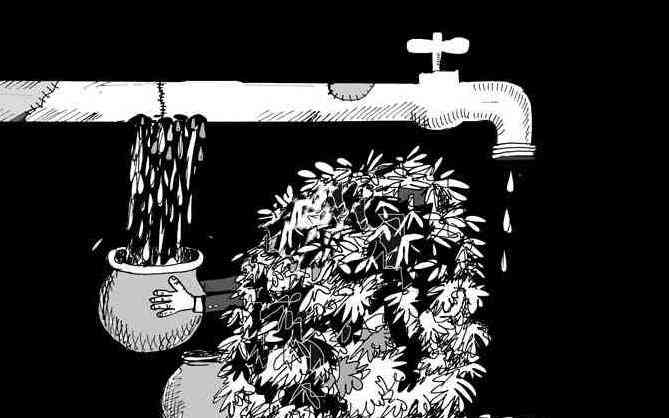
ZIMBABWE’S economic success is hampered by the twin evils of failure to support retired workers and State-owned enterprises that milk the fiscus.
However, the interventions suggested by the government fall far short to address the ills.
In the past two decades, Zimbabwe has changed its currency six times. Each time the currency was rebased or changed, the worst affected people were pensioners.
They saw their investments being wiped out — really wiped out — and now most pensioners depend on their children or well-wishers.
Let’s try to bring this issue closer to home. The National Social Security Authority (Nssa), the state-controlled pension fund, is struggling to pay pensioners.
The monthly payouts are insufficient to meet their obligations.
On the State-owned enterprises, two clear cut examples will suffice: the National Railways of Zimbabwe and Cold Storage Company (CSC).
These companies were monopolies, they had large contracts to supply services, but thanks to bad management, they are all technically and practically bankrupt.
- Boustead Beef seeks to end CSC corporate rescue
- CCC urged to push for dialogue over reforms
- A peep into Matenganyika’s artistic closets
- Boustead Beef seeks to end CSC corporate rescue
Keep Reading
And in the process, their demise has put a premium on every Zimbabwean life.
The cost of business has skyrocketed as roads are the only means to move baulk goods.
This also affects the roads. CSC’s demise has affected foreign currency earnings as the company can no longer export beef to the European Union and the local cost of beef has gone up.
President Emmerson Mnangagwa’s administration, note I deliberately avoid to call it regime because of the connotations surrounding the word, this week tried to solve the twin evils of pensions and bankrupt parastatals.
The nation was told that the Cabinet considered and approved the State Service Pensions Bill which was presented by Justice minister Ziyambi Ziyambi in his capacity as chairperson of the Cabinet committee on legislation.
Cabinet said: “The State Service Pensions Bill seeks to amend the State Service Pensions Act [Chapter 16:06], which was first enacted in July 1971. The main reason for amending the State Service Pensions Act is to reform the Public Service Pension Scheme.
“Cabinet recalled that the Government Pension Fund was created in 2019 when the government adopted the Defined Benefit Scheme. The proposed legislation would consolidate implementation of the policy.”
The government has lost a golden opportunity to have a holistic pension reform. All pensions, whether public or private, have failed workers. All pensioners irrespective of where they worked — public service or private sector — are struggling to make ends meet.
It is shocking why the Mnangagwa administration in its pension reforms has only decided to deal with public/civil servants only and not a wholesale pension reform.
The changes being proposed only affect or improve pension benefits for those who worked in the public service. Why does it not change Nssa or private pension funds?
One can only hazard that the administration worships capital and, for now, capital should make more money without shouldering the burden of taking care of its workers when they retire. It is state sanctioned slavery!
On parastatals or State-owned enterprises reforms, the Mnangagwa administration has brought out the only tool in the neoliberal toolkit — privatisation.
It is set on selling the family silver and most of the deals will be concluded under the table than on the table.
The government proposes inviting private sector participation in State-owned companies. The private sector can come in under four different categories, namely public-private partnerships in infrastructure development; public-private partnerships for commercial purposes; public-private partnerships where the government holds an asset and non-performing public-private partnership projects.
To cut the crap, under all these schemes, the government is proposing to retain between 26% and 30% of the State-owned enterprises, giving the private players a majority shareholding of between 70% and 74% plus management control of the enterprises.
Cabinet said: “Partnerships for infrastructure development are social or service projects such as roads, railways and border posts, where the asset remains with the government. Revenue sharing arrangements under this category should be at least 30% minimum and the government should be represented in the management committee.”
It added: “Public-private partnerships for commercial purposes are when a commercial government-owned company enters into a commercial arrangement with a private investor for profit purposes. The partnership will be implemented through the establishment of a special purpose vehicle, with the government having a minimum of 26% equity shareholding.”
This privatisation goes deeper than this. It even extends to land and minerals.
The Cabinet said: “In public-private partnerships where the government holds an asset such as land, a mining claim or national parks, the State’s equity shareholding shall be a minimum of 26%. A joint venture agreement will be entered into with the private investor.”
It is easy to note that the administration, despite having a deliberate Look East policy, has failed to learn from China on how it runs State-owned enterprises. China operates in the mode of State capitalism, where the private sector plays a peripheral role.
The Zanu PF government has failed to maintain the levels of managing the parastatals like the Rhodesian regime under Ian Douglas Smith.
The parastatals were contributing as much as 40% of Zimbabwe’s GDP.
Now we are in a situation where they all depend on Treasury handouts to keep afloat and have top-heavy management. They are the proverbial inverted pyramid.
It would be an injustice not to draw lessons from the book Why Nations Fail by Daron Acemoglu and James A Robinson.
The book posits that “the relative success of nations is due not to geography, culture, or ignorance, but rather is due to how inclusive their political institutions are”. In short, it is a leadership question.
It is clear that the piece-meal approach to pension reforms is not good for the country as it leaves many people out, who will need to depend on social welfare.
While the privatisation of State-owned companies, for now, seems like asset stripping by the politically-connected, these companies simply need good managers appointed on meritocracy and given room to work without political interference.
There it is, ladies and gentleman.
- Paidamoyo Muzulu is a journalist based in Harare. He writes here in his personal capacity.










